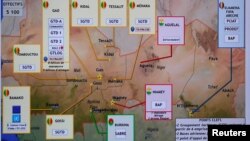Africa’s Sahel region, the semi-desert zone south of the Sahara Desert, is and has been under attack by terrorists for the better part of a decade.
In 2013, French and Malian troops helped re-take control of northern Mali from Islamist militants who had taken advantage of Mali’s internal conflict to impose their draconian rule on several cities there. Since then, the Sahel region has experienced a devastating surge in coordinated and ever-increasing terrorist attacks, both against civilian and military targets.
Intent on countering this threat, Burkina Faso, Chad, Mali, Mauritania and Niger, all of which border the Sahel, formed a Joint Force in 2017, under the auspices of the Group of Five for the Sahel first created in 2014, or otherwise known as the G5 Sahel.
On November 12, UN Under-Secretary-General for Peace Operations, Jean-Pierre Lacroix said, that the region is highly unstable, with civilians “paying the highest price … Against such a challenging backdrop, the work of the G5 Sahel Joint Force remains crucial.”
“The United States is alarmed by rising violent extremism, intercommunal violence, the growing humanitarian needs, and certain cases of democratic backsliding in the Sahel,” said Deputy U.S. Representative to the United Nations Richard Mills.
The G5 Sahel is a key part of a collective security response within the region. The United States is committed to continuing a strong bilateral partnership with Member States of the G5 Sahel by providing equipment, training, and advisory support for critical capability gaps, said Ambassador Mills.
“The United States has obligated more than $588 million to provide security assistance and other countering-violent extremism support to the five countries of the G5 Sahel since 2017. We believe this assistance has helped strengthen capacity and effectiveness while supporting efforts to address and protect human rights. We ask our partners to honor their pledges to the Joint Force, as well as the individual militaries, and join us in finding ways to do more with key Sahelian partners,”
However, Ambassador Mills added that “Our collective efforts in the Sahel must go beyond a military response … and address problems with governance,” he said. “Peaceful and timely transitions of power to democratically elected governments in Mali and Chad are essential to long-term prosperity and stability in the region.”














